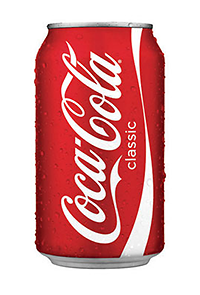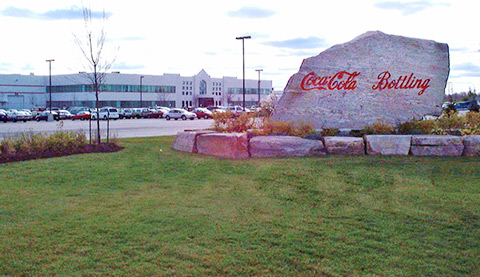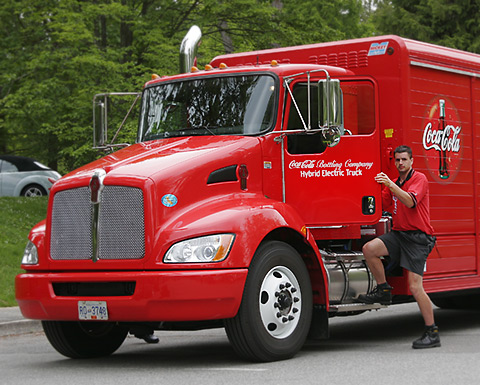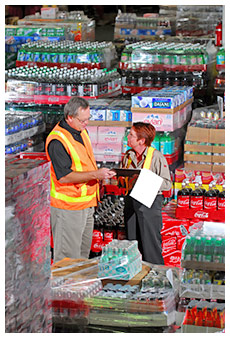 How does Coca-Cola integrate sustainability into their operations? For several years its facility in Brampton, Ontario, one of its largest in North America, has been transforming its manufacturing and distribution to save energy, reduce carbon footprint, water usage, and material usage. In this case study we look at the goals, implementation, and progress of the programs put in place by this $20 billion food and beverage giant.
How does Coca-Cola integrate sustainability into their operations? For several years its facility in Brampton, Ontario, one of its largest in North America, has been transforming its manufacturing and distribution to save energy, reduce carbon footprint, water usage, and material usage. In this case study we look at the goals, implementation, and progress of the programs put in place by this $20 billion food and beverage giant.
Coca-Cola‘s 600,000 square foot facility in Brampton houses the plant, management team, and warehouse. It has three plastic bottling lines, including a Dasani line; one bag-in-box line producing syrup for national accounts; one pre-mix line for the restaurant business, and one canning line. There are 650 plant operators, sales and equipment service representatives, truck drivers, warehouse employees, management and staff.
Located within the eco-business zone around Toronto Pearson International Airport, Coca-Cola in Brampton joins the local community of businesses to collaborate on green projects. Under the stewardship of Partners in Project Green, businesses participate in programs to reduce energy and resource costs, uncover new business opportunities, and address everyday operational challenges in a green and cost-effective manner. Other companies in this program include Xerox, Unilever, FedEx, Hewlett-Packard, Walmart, Kraft, and LoyaltyOne.

Social and environmental risks are now one of seven business risk categories and are formally embedded into Coca-Cola’s enterprise risk management process. This in turn guides the business processes, including annual planning, three-year business planning, and internal audit planning. As a result, sustainability decisions are becoming an integral part of the business decision making, commercialization and capital management processes, the three-year business planning process, and customer and supplier relationships. Highlighted here are some of their goals, implementation, and progress.
Energy Conservation and Climate Change
The goal is to reduce the overall carbon footprint of the business operations by 15 percent by 2020, as compared to the 2007 baseline.
The Brampton operation converted to an energy efficient lighting system that uses 50% less energy and provides 50% more light. These new fixtures also operate on motion sensors for even greater savings.
In the distribution channels, the company has installed 2000 EMS-55 energy management devices in vending machines. These devices activate lights and adjust cooling based on use, leading to improved energy efficiency by up to 35 percent.
In addition, the company installed 1,400 climate-friendly coolers at the 2010 Olympic Games to reduce greenhouse gas emissions by approximately 5,600 metric tons, the equivalent of taking about 1,200 cars off the road for an entire year.
Finally, 37 heavy-duty hybrid delivery trucks and tractors were introduced to the Canadian fleet in 2008 and 2009. These vehicles improve fuel consumption and reduce emissions by about one third and create less noise and emissions when stopped in traffic. Upgrading the warehouses with energy efficient loading bay doors can also make significant energy savings with pay back period of less than 2 years (see examples from Enerco).

Water Usage
The goal is to establish a water-sustainable operation to minimize water use and have a water-neutral impact on the local communities by safely returning the amount of water used in the beverages to the local communities and environment.
A 20% reduction in water use, accompanied by an efficiency ratio of 1.62 litres was achieved between 2005 and 2007. Plant teams focused on: 1) reducing the water use ratio; and 2) recycling the water used in operations (wastewater treatment).
To help reach its water usage goals the company developed and used a water conservation toolkit to identify actions that would conserve water. It implemented recycle and reclaim water loops through the plant’s membrane water treatment system. And it installed a new osmotic water recovery system designed to reclaim nearly 11 million litres of water for production. In addition water based container rinsers were replaced with ionized air rinsers and the lubrication system on all production lines was retrofitted to discontinue water use, saving approximately 28 million litres of water annually.
Sustainable Packaging and Recycling
The goals are to: (1) avoid the use of 100,000 metric tons of packaging materials between 2007 and 2010, (2) recycle or recover more than 90% of waste materials at production facilities by 2010, (3) increase recycled content in plastic (PET) bottles to an average of 10% by 2010.
 For goal (1), Dasani PET bottle weight was reduced by 30%, saving 493 metric tons of PET. Plastic twist-off closures were designed 24% lighter, saving 235 metric tons of resin. Also, lighter fibreboard was developed for Minute Maid products saving 124 metric tons of fiberboard annually. The company also launched the PlantBottle, a 100% recyclable packaging made with up to 30% plant-based waste materials.
For goal (1), Dasani PET bottle weight was reduced by 30%, saving 493 metric tons of PET. Plastic twist-off closures were designed 24% lighter, saving 235 metric tons of resin. Also, lighter fibreboard was developed for Minute Maid products saving 124 metric tons of fiberboard annually. The company also launched the PlantBottle, a 100% recyclable packaging made with up to 30% plant-based waste materials.
Goal (2) was achieved in 2009, ahead of schedule. The team also implemented a centralized recycling initiative that captures broken, damaged or expired product packaging from satellite facilities to be baled and sold to an industrial recycler.
Investments were made to achieve green innovations in recycling technologies, renewable packaging materials, vending and cooling equipment controls and design, and hybrid trucks.
Among the tools used was a proprietary packaging database to identify opportunities for future packaging material reductions and to benchmark performance against the global Coca-Cola system. See here for more on sustainable packaging.
The Coca-Cola operation in Brampton has shown that there are advantages to thinking “outside the box”. By respecting the finite nature of the earth’s water and resources the operation is implementing innovative business practices and contributing to the sustainability of communities while meeting the expectations of its stakeholders.
This case study is based in part on material provided by Partners in Project Green. Photos courtesy of Partners in Project Green.

Coca-Cola: a case study in sustainability http://bit.ly/r1vm77
How Coca-Cola uses #sustainability to reduce footprint and save money http://t.co/6anV3Oh #csr #packaging #recycling @CocaColaCo
Check out what Coke is doing … Coca-Cola: A Case Study In Sustainability http://t.co/gMdOuqq
Coca-Cola: A Case Study In Sustainability http://t.co/YnzXARW
Coca-Cola: A Case Study In Sustainability » Carbon49 – a blog on sustainability for Canadian businesses: http://t.co/DAiYzsX via @addthis
@ADHumlen Tweet with right URL: Bravo! #Coca-Cola’s Case Study In #Sustainability via @carbon49 http://t.co/6anV3Oh #brand #csr #cpg
Coca-Cola: A Case Study In Sustainability http://t.co/zYcHyfI #cpg #tradepromotion @tradeinsight
Great insight re: #Coca-Cola’s case study in #sustainability via @Carbon49 http://goo.gl/FnG5C #brand #csr #cpg
How green is Coca Cola? http://ow.ly/5TD5r
[…] activities, while transportation-related initiatives were commonly cited. (See case studies on Coca-Cola, Sears, Unilever, […]
How does Coca-Cola integrate sustainability into their operations? http://t.co/JOnhiUZb
I really enjoy this web site , it contains great content.
[…] use an example, if you are in the soft drinks business like Coca-Cola, the bulk of your products’ content is water. If water becomes scarce, that would have a […]
[…] BMW, LG, HP, Coca-Cola, and Walmart are among the 187 companies cited by non-profit Carbon Disclosure Project for doing […]
[…] BMW, LG, HP, Coca-Cola, and Walmart are among the 187 companies cited by non-profit Carbon Disclosure Project for doing […]
[…] BMW, LG, HP, Coca-Cola, and Walmart are among the 187 companies cited by non-profit Carbon Disclosure Project for doing […]
[…] (Follow links for recent green initiatives on energy, waste, packaging, and recycling by Coca-Cola Canada and Walmart […]
[…] (Follow links for recent green initiatives on energy, waste, packaging, and recycling by Coca-Cola Canada and Walmart […]
[…] cars, tractor trailers, etc.) with electric ones is one option. Going hybrid is another. (See how Coca-Cola Canada added 37 heavy-duty hybrid delivery trucks and tractors to their fleet.) I don’t have any financial analysis on choosing these routes but the initial capital costs […]